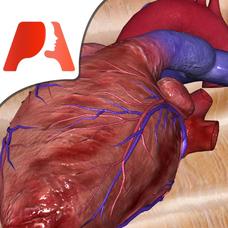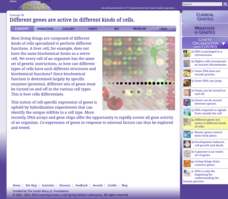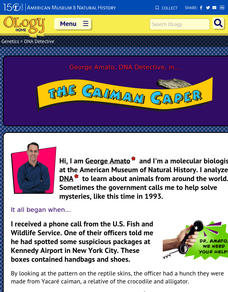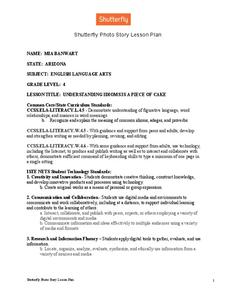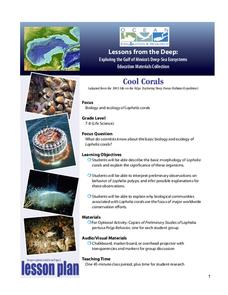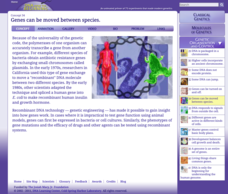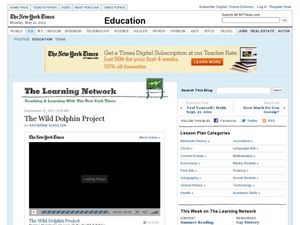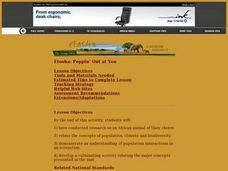Pocket Anatomy
Pocket Heart
An all-encompassing, fully interactive, gorgeously animated model of the heart can be used to teach cardiac anatomy, physiology, and even a touch of epidemiology.
Curated OER
Bite on This!
Different types of teeth have different roles. Third graders study how molars, incisors, and canines function in a rabbit skull and a cat skull. After answering some questions about the teeth of herbivores and carnivores, kids...
Cold Spring Harbor Laboratory
Different Genes Are Active in Different Kinds of Cells
Personalized medicine prevents many trial-and-error scenarios when time counts the most. Learn how gene expression and screening genomes improves health outcomes in cancer patients, those with auto-immune disorders, and more. An online...
American Museum of Natural History
DNA Detective
Match up the DNA code. Pupils read the website from the American Museum of Natural History about how DNA can determine whether a skin is from a particular type of reptile. Using the same technique, learners match up products with the...
Shutterfly
Photo Story Lesson Plan
After reading Loree Leedy's There's a Frog in My Throat: 440 Animal Sayings a Little Bird Told Me, kids create and illustrate their own poems that convey the meaning of an idiom. The poems are then transferred into Shutterfly's Photo...
Curated OER
Bug's Eye View
Investigate the life of bugs and how they interact with the environment in this integrated science and language arts instructional activity. Young scientists construct mini environments in cages in order to make observations. This data...
American Museum of Natural History
What's This? Feeding
Some species have pretty creative methods for catching food. Young scientists learn about some interesting ways organisms get the nutrients they need by navigating an online interactive lesson that would be suitable for a remote learning...
NOAA
Deep-Sea Ecosystems – Cool Corals
Young oceanographers research deep sea corals that thrive on chemosynthesis. The lesson plan focuses on the biology of the animal, preferred habitat, associations, and interactions.
Cold Spring Harbor Laboratory
Living Things Share Common Genes
Everything evolved from a common ancestor, but how did modern plants and animals develop so many more genes? Scholars use an online interactive to learn about the process. They begin to understand common genes with an animation, multiple...
Cold Spring Harbor Laboratory
Genes Can Be Moved Between Species
Biotechnology changes lives every day, but how did it all start? Learn about Cohen and Boyer's technique for recombinant DNA and the founding of this new scientific study. Then, scholars use the online interactive to discover how Hanahan...
Curated OER
One Word Substitution 4
In this online interactive vocabulary skills worksheet, students match the 10 vocabulary terms in the word bank to the appropriate definitions. Students may submit their answers to be scored.
Curated OER
Ecosystem Interactions in Refuges
Seventh graders, using national parks as models, illustrate the energy flow in ecosystems. Working in groups, they use murals, flow charts, or other visual displays to record their findings. Students represent the food chains and webs...
Curated OER
Candy in Of Mice and Men: Fun Trivia Quiz
Cover Candy from Of Mice and Men with this short online interactive quiz. Class members answer ten multiple choice and true/false questions about the character Candy. These are basic questions that you could use as a check for...
Curated OER
Bringing Up Birdy
Students explore biology by creating diagrams of animal life cycles. In this baby bird instructional activity, students view video clips of birds being born from incubation to flying on their own. Students utilize the Internet to...
Curated OER
The Wild Dolphin Project
Inspire young marine biologists to study animals in the wild with this assignment. Pupils view an eight-minute video and read an article in the New York Times about Denise Herzing's 25-year long study of dolphins in their own...
Curated OER
Cellular Models
Each student construct a model of a cell on a large cookie, including the parts which were discussed during lecture.? Half of the class will be instructed to make plant cell models and the other half will be in charge of animal cell...
Shmoop
ELA.CCSS.ELA-Literacy.SL.11-12.5
If you allow the space for your class members to be creative with technology as they make a presentation, they will make you proud with their inventiveness. The resource suggests an open research project for which pupils look up...
Curated OER
Egg Words Crossword Puzzle
This crossword puzzle is all about eggs! Learners use the given clues to fill in the squares in the puzzle. Since this is an online interactive resource, immediate feedback is available; although it only tells you whether you are wrong...
Curated OER
How to Write an Essay: Secondary ed.
Whether introducing the structure of expository essays or reviewing the format with your high schoolers, take the time to check out this resource. Examples of seven common forms of introductory paragraphs and six types of conclusions, as...
Curated OER
Dinosaurs
Students are introduced to the various types of dinosaurs and write in their journals about their favorite one. After listening to a story and watching a filmstrip, they color a few pages in their Dinosaur Friends Book. They also examine...
Science Matters
Island Fox Outreach
Off the coast of California lives a wild animal called the Island Fox. Experts discuss the importance of the Island Fox to the Channel Islands and the balance the fox creates within its ecosystem. The lesson plan concludes with a reading...
Science 4 Inquiry
At the Top: A Bald Eagle's Diet
Bald eagles are opportunistic predators and eat fish as well as raccoons and other mammals. Pupils learn about bald eagle diets through a simple simulation and videos. They collect and analyze data to understand the adaptability of this...
Curated OER
Creatures of the Ocean
Second graders examine the characteristics of a specific ocean creature. In pairs, 2nd graders create a graphic organizer to list categories and supporting details of the ocean creature. Students review data and use it to write a report...
Curated OER
Etosha: Poppin' Out at You
Tenth graders research an African animal of their choice and relate the concepts of population, climate and biodiversity to their animal. They examine how population interacts in an ecosystem.
